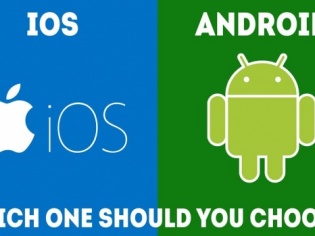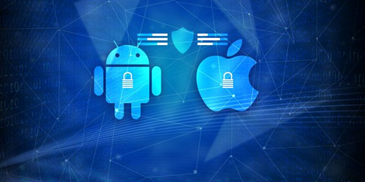-
Team TechTree
08:58 18th Jan, 2020
Android vs. iOS – Five Areas Where Apple Scores over Google | TechTree.com
Android vs. iOS – Five Areas Where Apple Scores over Google
The headline alone is enough to raise the hackles of Android fanboys, but the fact remains that in spite of several things going for it, Apple’s OS does beat them on a few fronts

Android users are seldom averse to give a plethora of reasons as to why the operating system is sharper and smarter than what comes bundled with the iPhone. Starting with the benefits of an open platform, they would suggest versatility, customization and value for money as immediate points where Google’s mobile OS scores over that of its arch-rival.
However, ask them what keeps Apple users hooked to the iPhone and they’d shrug their shoulders and utter the word “fanboys”, an oblique reference to the abject lack of data-driven behavior that they charge iPhone users with. Of course, there’s more than a modicum of truth in the statement but then the truth, as always, lies somewhere in between. Let’s check it out…
- The Faster of the Duo – Even the biggest Android fanboy would accept that the rate at which the iPhones slowdown is way slower than that of Android phones. This, in spite of the fact that even the latest smartphone from Apple runs on a six-core CPU with 4GB of RAM, which would appear to be a past generation gadget in the world of Android. We had recently reported on the Xiaomi Black Shark with eight-core CPU and 16GB of RAM. The fact is that we get lost in the specs without measuring it against performance. Moreover, till date Apple processors have proved better than Qualcomm’s. Quite simply, they’re optimized to work perfectly with Apple gadgets while Android suffers because it is air-dropped into a variety of smartphones without customization. Moreover, the closed ecosystem of Apple ensures it doesn’t need power-packed innards because there’s better optimization between hardware and software. There may be exceptions of course such as Google’s own Pixel series that has a much better integration

- The Idiot-proofing Smartphone – While this may sound like an oxymoron, the fact remains that the iPhones run a better UX, thanks to its intuitive nature. Too many gadget makers take Android and tweak it to their convenience, leaving the poor user confused when she changes from one brand to the other. Apple users have no such qualms as each phone works exactly like the upgrade when it comes to standard features. The fact is most users aren’t interested in customized commands, which is a fact that Android misses out. iPhone users thrive on standardization, which Android developers hate and erroneously assume that so do its users.
- The Security Shield – Ever since Apple began publicizing its security features, Google has been working overtime and is pretty much on even keel with the iOS. However, the challenge is that though Google does its work and updates its own Pixel range and those in the Android One category, the lower-end gadget brands don’t get all the updates which means increased vulnerability. Just yesterday, we reported on the fleece ware that got downloaded from Play Store and installed by a whopping 600 million users. As of now, iOS is more consistent with upgrades though it also means that some of the older smartphones are rendered out of service purview of security.

- Building the Ecosystem – Apple managed to tie up an entire suite of products around the operating system because of the latter’s proprietary nature while Google has struggled on this front due to the open source nature and the large number of developers working on the software as well as the apps that run on them. As a result, the instances of misfiring apps have been far less on the iPhone while Android continues to struggle. Having said so, the fact is that Google is continuously getting better at integrating its services across devices though even now the company is comparatively lax when it comes to creating a uniform experience across multiple devices. Google’s open structure works well for those who dig technology, while Apple’s walled garden approach makes it easier for non-techs. Which also possibly explains why the App Store is better policed than the Play Store.
- The Market Advantage – Well, this isn’t exactly because the Android is any inferior but the market dynamics is such that the iPhones fetch a better resale than its counterparts. There’re just far too many Android users seeking to upgrade compared to the iOS ones that the pricing takes a hit in the second-hand market. A quick look at the used phone numbers suggests that while an iPhone can get up to 40-45% of its value over two years, even the best of Android phones such as the Pixel or Galaxy fetches only 25-30%. Dumb it down to mid-tier models, and there’s hardly any resale value.
Of course, none of this actually means that the iOS is superior to the Android. It is just that while the operating system created by Google has withstood the test of time and carries itself very well across multiple brands, Apple is reaping the rewards of a closed ecosystem where the entire manufacturing system is in sync with the software development lifecycle.
TAGS: Google, Android, Apple, Qualcomm, processors, Android Security, Google Security, iOS
- DRIFE Begins Operations in Namma Bengaluru
- Sevenaire launches ‘NEPTUNE’ – 24W Portable Speaker with RGB LED Lights
- Inbase launches ‘Urban Q1 Pro’ TWS Earbuds with Smart Touch control in India
- Airtel announces Rs 6000 cashback on purchase of smartphones from leading brands
- 78% of Indians are saving to spend during the festive season and 72% will splurge on gadgets & electronics
- 5 Tips For Buying A TV This Festive Season
- Facebook launches its largest creator education program in India
- 5 educational tech toys for young and aspiring engineers
- Mid-range smartphones emerge as customer favourites this festive season, reveals Amazon survey
- COLORFUL Launches Onebot M24A1 AIO PC for Professionals







TECHTREE